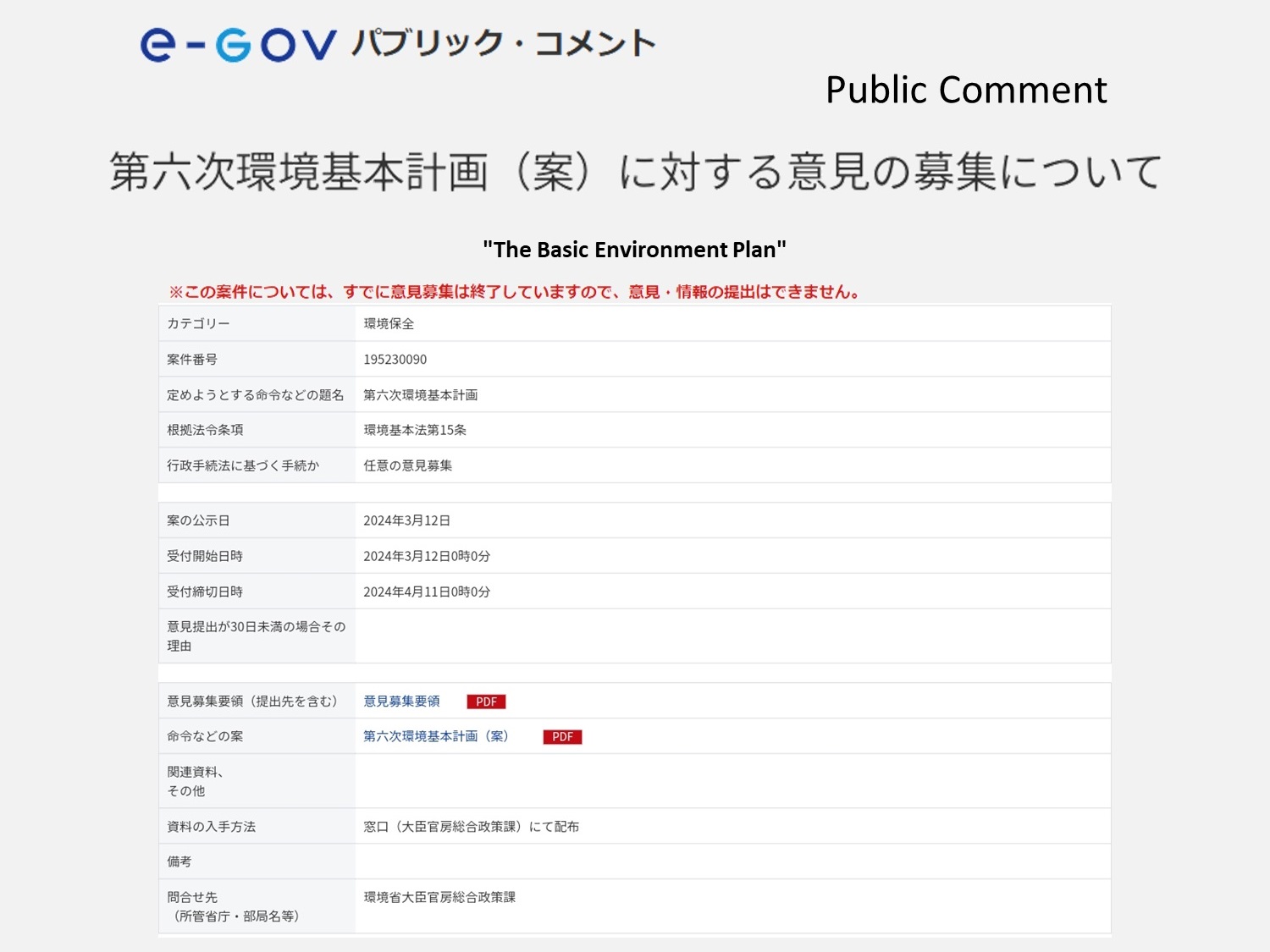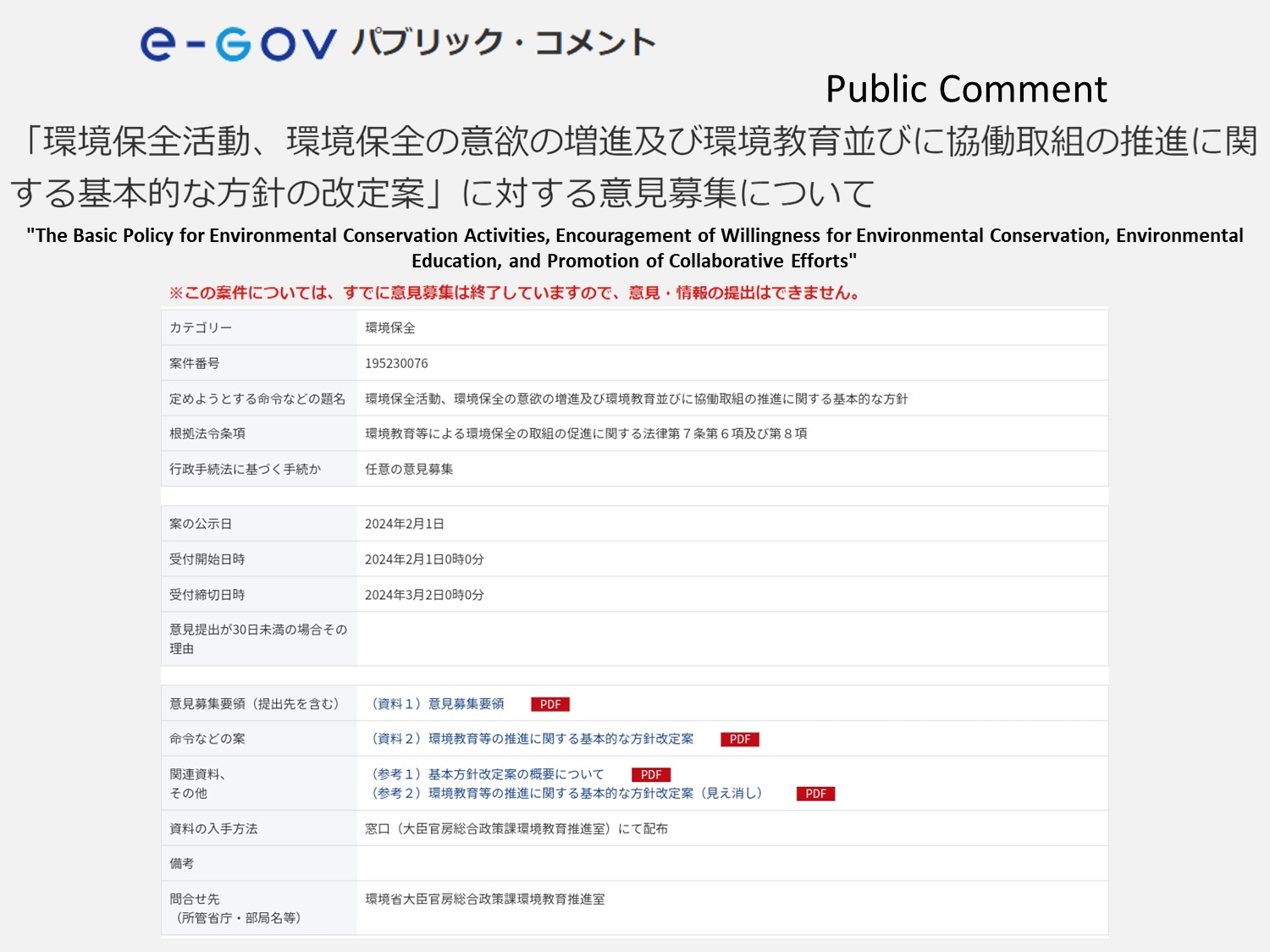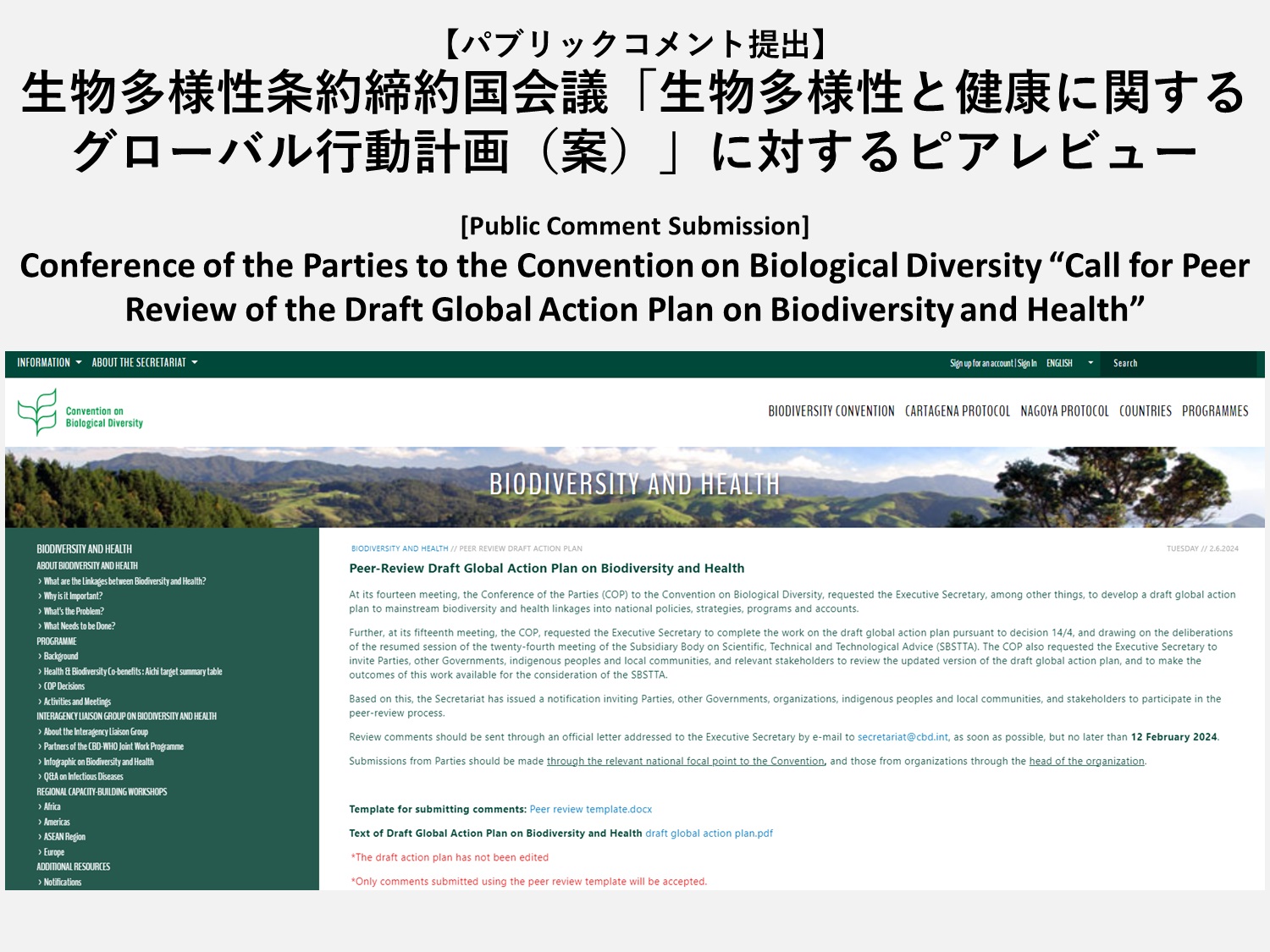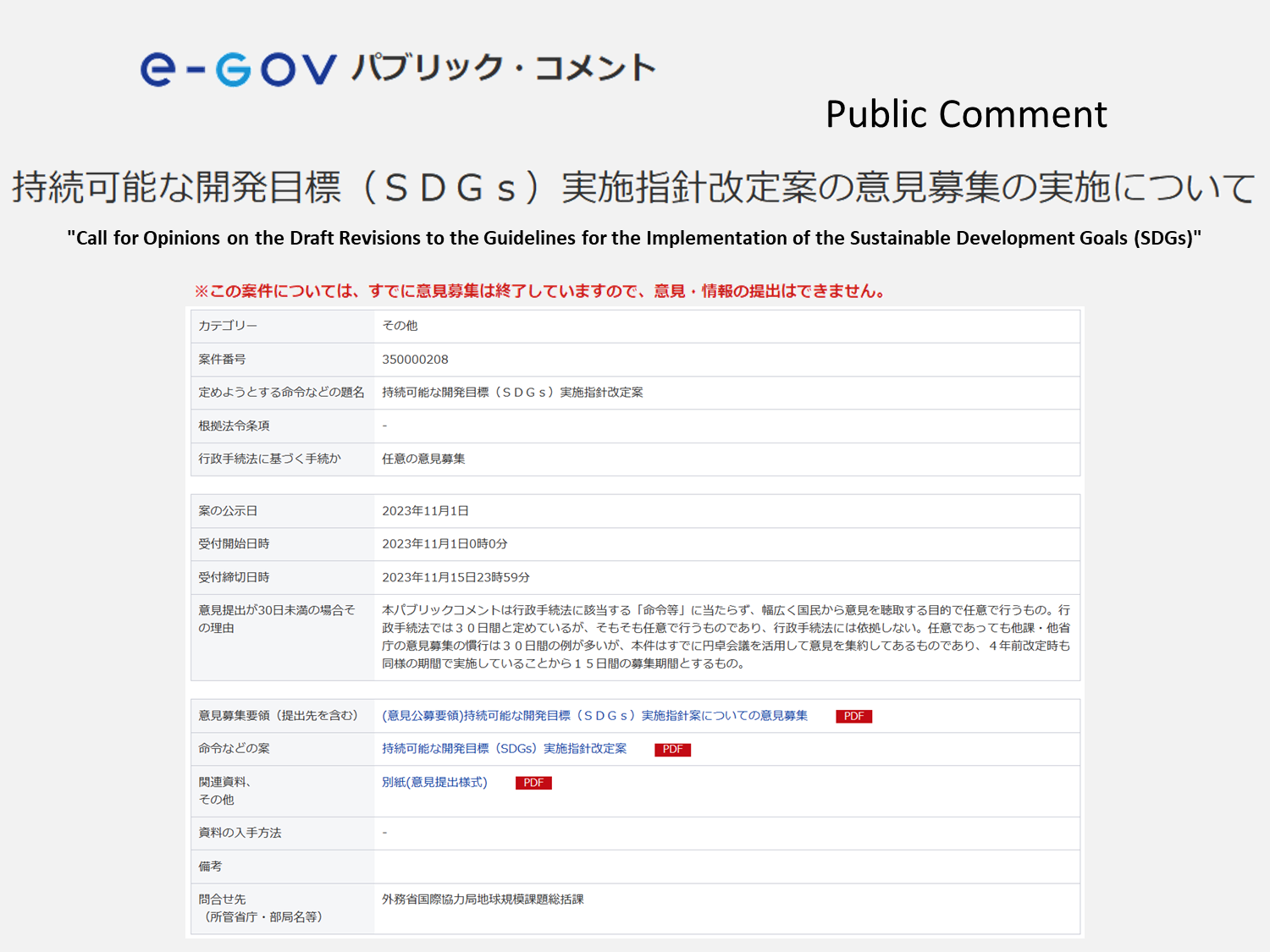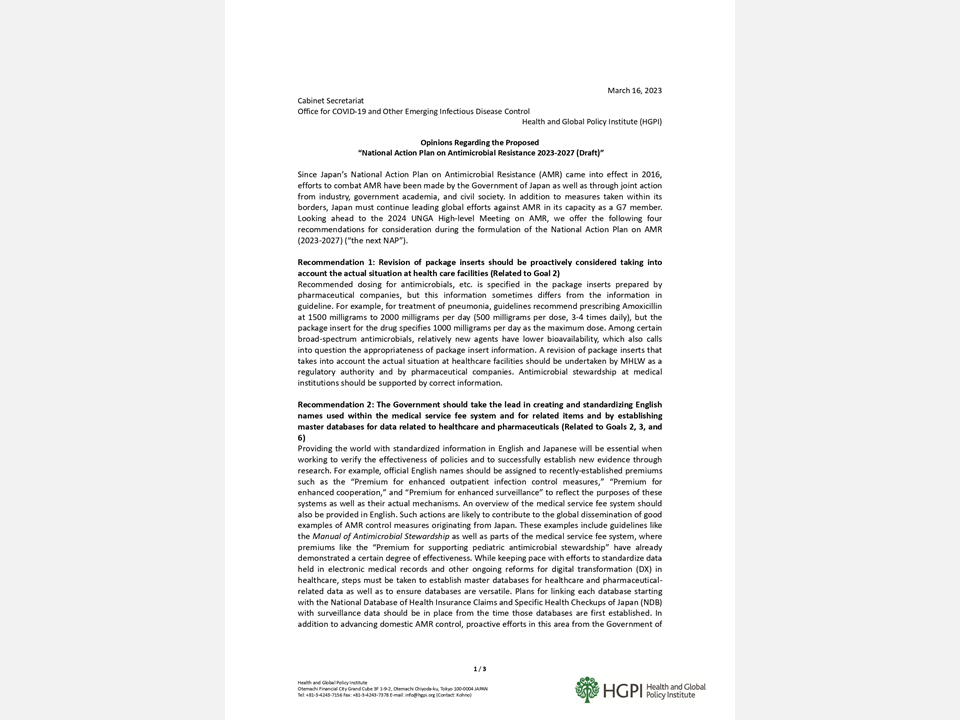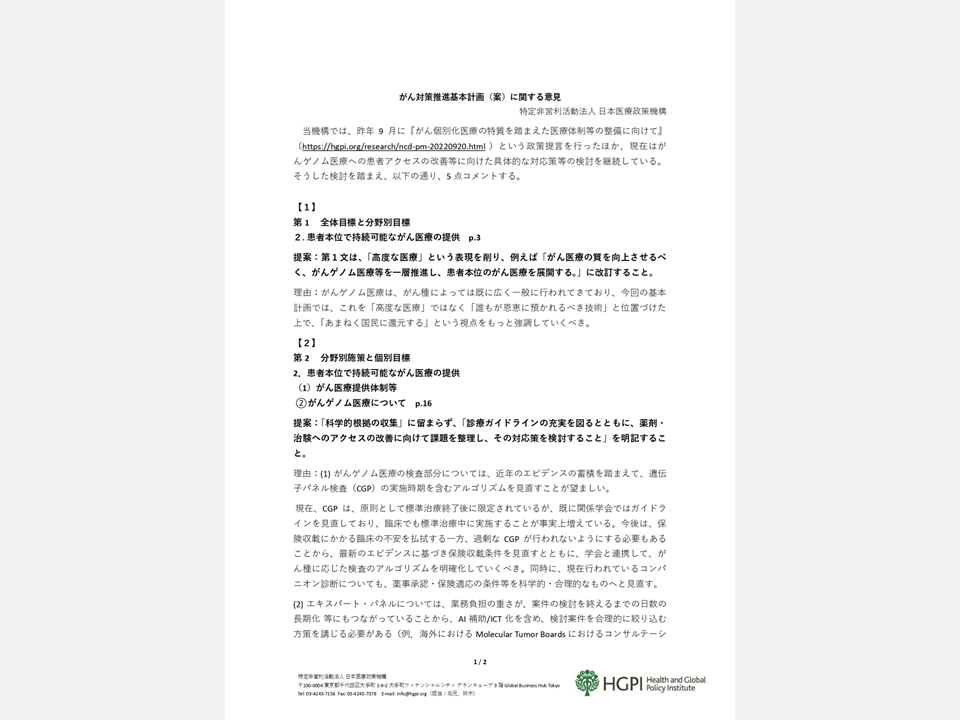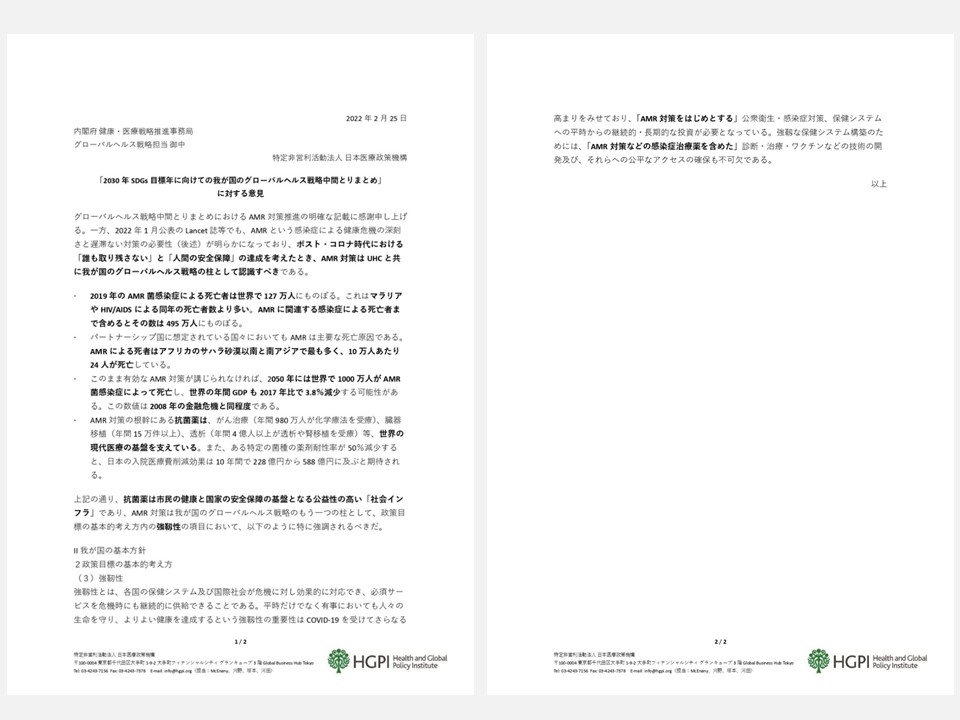[Public Comment Submission] “National Action Plan for Pandemic Influenza and New Infectious Diseases (Draft)” (May 7, 2024)
date : 6/3/2024
Tags: AMR, Vaccinations
![[Public Comment Submission] “National Action Plan for Pandemic Influenza and New Infectious Diseases (Draft)” (May 7, 2024)](https://hgpi.org/en/wp-content/uploads/sites/2/HGPI_240507_CAICMeyecatch.jpg)
Health and Global Policy Institute’s Antimicrobial Resistance (AMR) Team and Vaccinations Team submitted their written opinion on the draft of “National Action Plan for Pandemic Influenza and New Infectious Diseases” by the Cabinet Agency for Infectious Disease Crisis Management (CAICM), the Cabinet Secretariat. (The call for public comments is now closed.)
As the Act on the Prevention of Infectious Diseases and Medical Care for Patients with Infectious Diseases notes in its preamble, mankind has overcome a variety of infectious diseases. However, the threat of new and re-emerging infectious diseases persists, and Coronavirus Disease 2019 (COVID-19) will not be the last infectious disease crisis. Instead of continuing to respond with panic and neglect when faced with the ever-changing circumstances of a health crisis, we must implement all possible prevention and preparedness when emergencies are not occurring to minimize the impact of future health crises as well as to reinforce our capacity for response to such events. Particularly pressing issues include researching and developing vaccines, diagnostics, and therapeutics, and ensuring their smooth and stable supply; and developing human resources related to infectious disease countermeasures.
CAICM was established in September 2023 to reinforce the Government’s capacity to serve as a central command tower during both ordinary times as well during emergencies. Making the most of lessons from the COVID-19 pandemic, the National Action Plan for Pandemic Influenza and New Infectious Diseases is now set to be revised according to the Act on Special Measures for Pandemic Influenza and New Infectious Diseases Preparedness and Response to strengthen prevention, preparedness, and response (PPR) for the next infectious disease crisis. It will include measures for addressing unjust discrimination or bias against patients with infectious diseases as well as for handling false or misleading information.
Key points of our public comment
- In addition to patients with infectious diseases, their families, and healthcare professionals, steps should also be taken to prevent discrimination or prejudice against businesses that may be suspected of being hotbeds for the spread of infections.
- To contribute to the smooth rollout of vaccines, etc. during emergencies and to minimize the incidence of serious illness and death, it will be important to review the structure of the system for routine vaccinations during periods of non-emergency (i.e., preparatory periods) to ensure it is ideal.
- When promoting research and development (R&D) for vaccines, diagnostics, and therapeutics, centered on Medical Countermeasures (MCMs) that will be vital in responding to infectious disease crises, it will be necessary to provide pull incentives that support R&D over multiple years.
- Training infectious disease specialists, technical staff, and other human resources will be vital. When doing so, it will be essential to engage in collaboration that surpasses the Cabinet Secretariat—which is responsible for formulating the National Action Plan—to include the Ministry of Health, Labour and Welfare, the Ministry of Finance, and the Ministry of Education, Culture, Sports, Science and Technology.
For more information on this public comment, please click here (only available in Japanese).
Top Research & Recommendations Posts
- [Policy Recommendations] The Path to a Sustainable Healthcare System: Three Key Objectives for Public Deliberation (January 22, 2026)
- [Research Report] Perceptions, Knowledge, Actions and Perspectives of Healthcare Organizations in Japan in Relation to Climate Change and Health: A Cross-Sectional Study (November 13, 2025)
- [Research Report] The 2025 Public Opinion Survey on Healthcare in Japan (March 17, 2025)
- [Policy Recommendations] Reshaping Japan’s Immunization Policy for Life Course Coverage and Vaccine Equity: Challenges and Prospects for an Era of Prevention and Health Promotion (April 25, 2025)
- [Research Report] The 2023 Public Opinion Survey on Satisfaction in Healthcare in Japan and Healthcare Applications of Generative AI (January 11, 2024)
- [Research Report] AMR Policy Update #4: Cancer Care and AMR (Part 1)
- [Policy Recommendations] Developing a National Health and Climate Strategy for Japan (June 26, 2024)
- [Public Comment Submission] “Assessment Report on Climate Change Impacts in Japan (Draft Overview)” (December 24, 2025)
- [Research Report] Survey of Japanese Physicians Regarding Climate Change and Health (December 3, 2023)
- [Research Report] The Public Opinion Survey on Child-Rearing in Modern Japan (Final Report) (March 4, 2022)
Featured Posts
-
2026-01-09
[Registration Open] (Hybrid Format) Dementia Project FY2025 Initiative Concluding Symposium “The Future of Dementia Policy Surrounding Families and Others Who Care for People with Dementia” (March 9, 2026)
![[Registration Open] (Hybrid Format) Dementia Project FY2025 Initiative Concluding Symposium “The Future of Dementia Policy Surrounding Families and Others Who Care for People with Dementia” (March 9, 2026)](https://hgpi.org/en/wp-content/uploads/sites/2/dementia-20260309-top.png)
-
2026-02-05
[Registration Open] (Webinar) The 141st HGPI Seminar “Current Status and Future Prospects of Korea’s Obesity Policy: Voices of People with Lived Experience in Policy Promotion” (March 3, 2026)
![[Registration Open] (Webinar) The 141st HGPI Seminar “Current Status and Future Prospects of Korea’s Obesity Policy: Voices of People with Lived Experience in Policy Promotion” (March 3, 2026)](https://hgpi.org/en/wp-content/uploads/sites/2/hs141-top-1.png)
-
2026-02-06
[Research Report] AMR Policy Update #5: Cancer Care and AMR (Part 2)
![[Research Report] AMR Policy Update #5: Cancer Care and AMR (Part 2)](https://hgpi.org/en/wp-content/uploads/sites/2/HGPI_20260204_AMR-Policy-Update-5.png)




